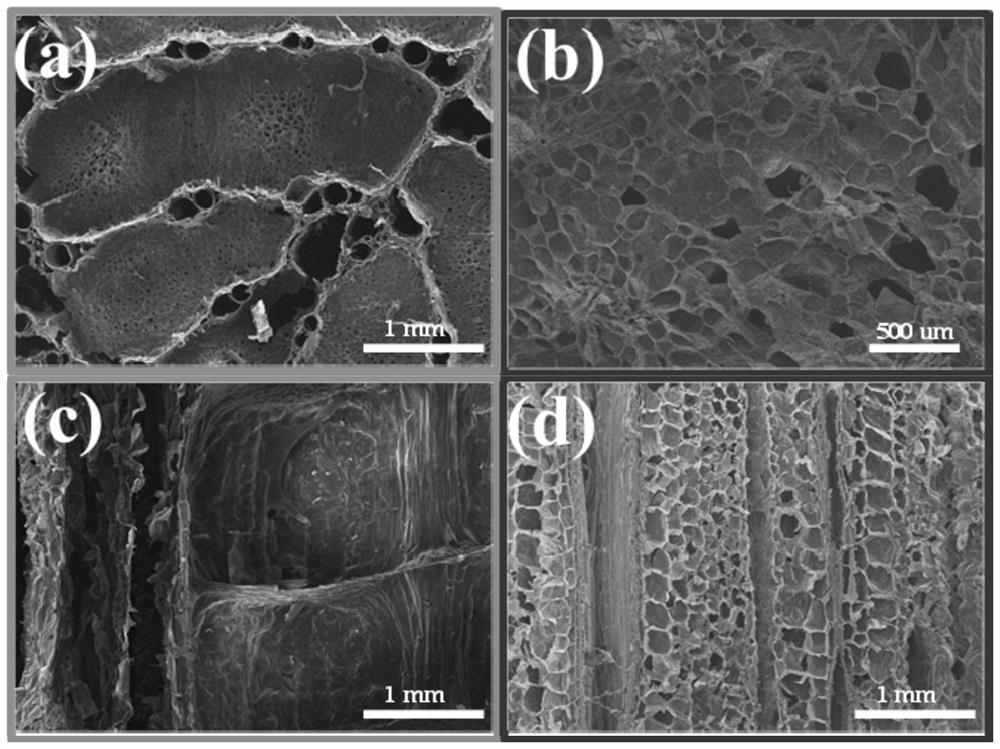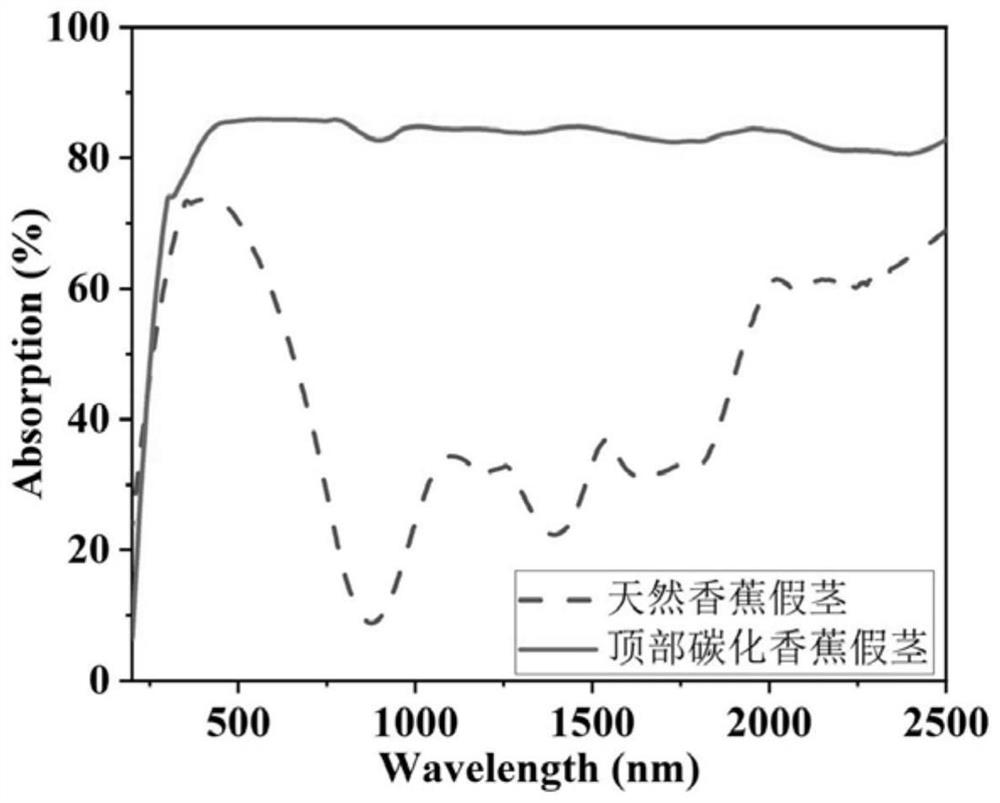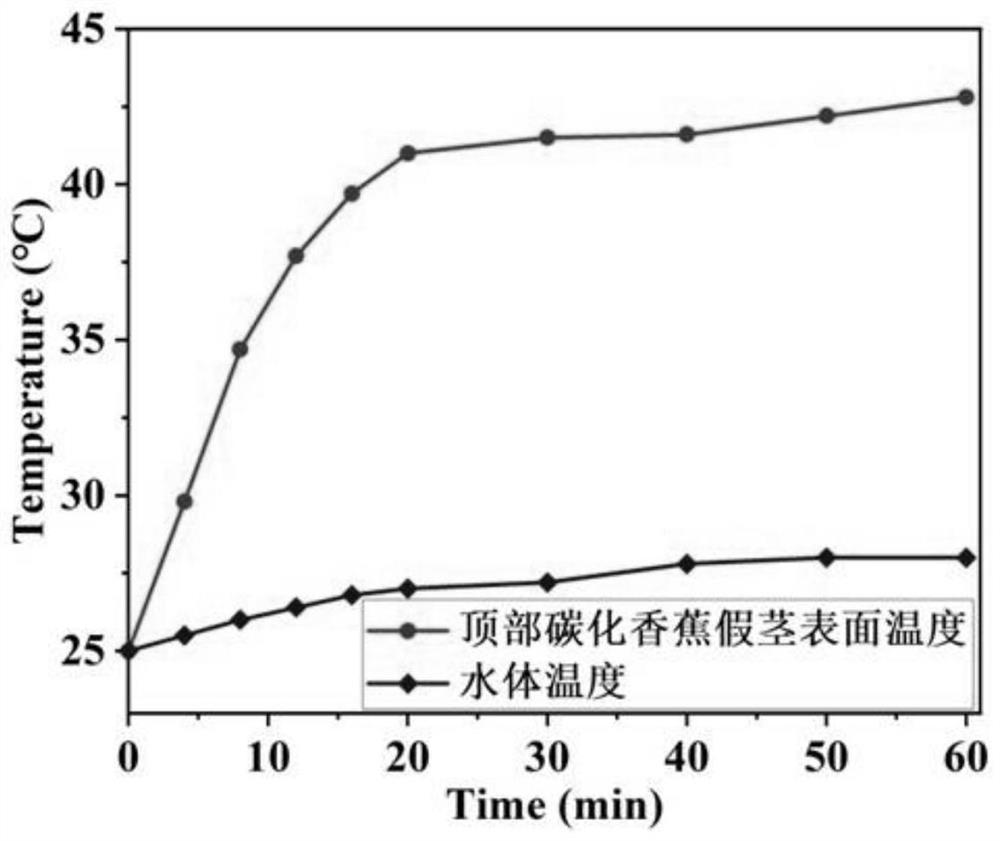Plant bionic high-concentration-salt-resistant solar evaporator device and preparation method and application thereof
A plant bionic and solar energy technology, which is applied in the field of plant bionic anti-high salt solar evaporation devices and its preparation, can solve the problems of affecting light absorption and water vapor escape, high cost of photothermal conversion materials, and obstacles to large-scale production and application. Achieve high light-to-heat conversion efficiency, good light absorption performance, and speed up the escape of steam
- Summary
- Abstract
- Description
- Claims
- Application Information
AI Technical Summary
Problems solved by technology
Method used
Image
Examples
Embodiment 1
[0037] Embodiment 1: a kind of preparation method of plant bionic anti-high concentration salt solar evaporation device, it comprises the following steps:
[0038] S1. Pre-treatment: select the stalks of reeds, cut them into large pieces along the longitudinal growth direction, freeze them at -25°C for 45 hours, put them into a freeze dryer for 70 hours after freezing, and obtain the stalks;
[0039] S2. Stem design: First, bundle the reed stalks so that the top surface area is 3.14cm 2 , a cylinder with a height of 1cm; secondly, punch 8 small holes with a diameter of 0.5mm on the outermost reed stalks to form artificial small holes, and then use the flame of an alcohol lamp to carbonize the top of the pseudostem for 3 minutes to form 1mm thickness of carbon black layer; finally, the cotton thread passes through the artificial small hole to bridge with the salt water of different solution heights and different concentrations on both sides.
Embodiment 2
[0040] Embodiment 2: a kind of preparation method of plant bionic anti-high concentration salt solar evaporation device, it comprises the following steps:
[0041] S1. Pretreatment: select the stalks of plant ramie, cut them into large pieces along the longitudinal growth direction, freeze them at -15°C for 52 hours, put them into a freeze dryer for 80 hours after freezing, and obtain the stalks;
[0042] S2. Stem design: First, bundle the ramie stalks so that the top surface area is 3.14cm 2 , a cylinder with a height of 1cm; secondly, punch 8 small holes with a diameter of 0.5mm on the outermost ramie stalks to form artificial small holes, and then use the flame of an alcohol lamp to carbonize the top of the pseudostem for 4 minutes to form 2mm thickness of carbon black layer; finally, the cotton thread passes through the artificial small hole to bridge with the salt water of different solution heights and different concentrations on both sides.
Embodiment 3
[0043]Embodiment 3: a kind of preparation method of plant bionic anti-high concentration salt solar evaporation device, it comprises the following steps:
[0044] S1. Pre-treatment: select flax stalks, cut them into large pieces along the longitudinal growth direction, freeze them at -18°C for 48 hours, put them in a freeze dryer for 75 hours after freezing, and obtain the stalks;
[0045] S2. Stem design: First, bundle the flax stalks so that the top surface area is 3.14cm 2 , a cylinder with a height of 1cm; secondly, punch 8 small holes with a diameter of 0.5mm on the outermost flax stalks to form artificial small holes, and then use the flame of an alcohol lamp to carbonize the top of the pseudostem for 2 minutes to form 1.5 A carbon black layer with a thickness of mm; finally, a cotton thread is passed through an artificial small hole to bridge with saline with different solution heights and different concentrations on both sides.
[0046] The beneficial effect of the pr...
PUM
| Property | Measurement | Unit |
|---|---|---|
| Thickness | aaaaa | aaaaa |
| Thickness | aaaaa | aaaaa |
| Length | aaaaa | aaaaa |
Abstract
Description
Claims
Application Information
 Login to View More
Login to View More - R&D
- Intellectual Property
- Life Sciences
- Materials
- Tech Scout
- Unparalleled Data Quality
- Higher Quality Content
- 60% Fewer Hallucinations
Browse by: Latest US Patents, China's latest patents, Technical Efficacy Thesaurus, Application Domain, Technology Topic, Popular Technical Reports.
© 2025 PatSnap. All rights reserved.Legal|Privacy policy|Modern Slavery Act Transparency Statement|Sitemap|About US| Contact US: help@patsnap.com



